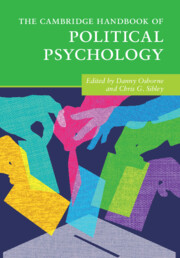Book contents
- The Cambridge Handbook of Political Psychology
- The Cambridge Handbook of Political Psychology
- Copyright page
- Dedication
- Contents
- Figures
- Tables
- Contributors
- Part I Foundations of Political Psychology
- Part II The Politics of Intergroup Attitudes
- Part III Contemporary Challenges to Democracy
- 23 The Political Psychology of Inequality
- 24 How Social Class Influences Political Choices
- 25 Fear and Loathing in American Politics
- 26 Political Extremism
- 27 The Politics of Hate
- 28 Populism
- 29 A Cultural Theory of Autocracy-vs-Democracy
- 30 Psychological Theories Meet the Challenge of Persuading and Mobilising Voters
- 31 Collective Action for Social Change
- 32 Opinion Formation and Polarisation in the News Feed Era
- 33 Conspiracy Theory Belief and Conspiratorial Thinking
- 34 Political Psychology and the Climate Crisis
- 35 The Political Psychology of Cyberterrorism
- 36 Reconciliation in the Aftermath of Collective Violence
- Part IV Diversifying Perspectives in Political Psychology
- Index
- References
24 - How Social Class Influences Political Choices
from Part III - Contemporary Challenges to Democracy
Published online by Cambridge University Press: 17 February 2022
- The Cambridge Handbook of Political Psychology
- The Cambridge Handbook of Political Psychology
- Copyright page
- Dedication
- Contents
- Figures
- Tables
- Contributors
- Part I Foundations of Political Psychology
- Part II The Politics of Intergroup Attitudes
- Part III Contemporary Challenges to Democracy
- 23 The Political Psychology of Inequality
- 24 How Social Class Influences Political Choices
- 25 Fear and Loathing in American Politics
- 26 Political Extremism
- 27 The Politics of Hate
- 28 Populism
- 29 A Cultural Theory of Autocracy-vs-Democracy
- 30 Psychological Theories Meet the Challenge of Persuading and Mobilising Voters
- 31 Collective Action for Social Change
- 32 Opinion Formation and Polarisation in the News Feed Era
- 33 Conspiracy Theory Belief and Conspiratorial Thinking
- 34 Political Psychology and the Climate Crisis
- 35 The Political Psychology of Cyberterrorism
- 36 Reconciliation in the Aftermath of Collective Violence
- Part IV Diversifying Perspectives in Political Psychology
- Index
- References
Summary
This chapter examines research from political science, sociology, and psychology to understand how and why class position is associated with differences in political attitudes and choices. After reviewing influential definitions of social class, we examine research on explanations of class differences in political behaviour. These include class differences in identity, values and self-interest, authoritarianism, and control. We then review explanations for changes in political choices between classes over time, focusing on supply-side versus demand-side interpretations of declining levels of class voting in Western democracies, and emphasising the effects of party programmatic convergence on the political relevance of class-based values. Finally we assess recent interpretations of the rise of working-class support for the radical right political support, pointing to the limitations of status threat accounts, and noting that such political choices are more powerfully associated with educational attainment than with class position. We consider whether this suggests a reconfiguration of electoral behaviour from a class-based to an educational divide.
- Type
- Chapter
- Information
- The Cambridge Handbook of Political Psychology , pp. 382 - 398Publisher: Cambridge University PressPrint publication year: 2022
References
- 3
- Cited by

